Community Voices

inside this issue South Australian Multicultural Charter Young Australian of the Year Building Employer Confidence in Disability AUTUMN
2023
Photo: MCCSA's International Women's Day Walk, outside Parliament House
MCCSA BOARD
Executive
Chairperson: Miriam Cocking
Deputy Chairperson: Dr Ian
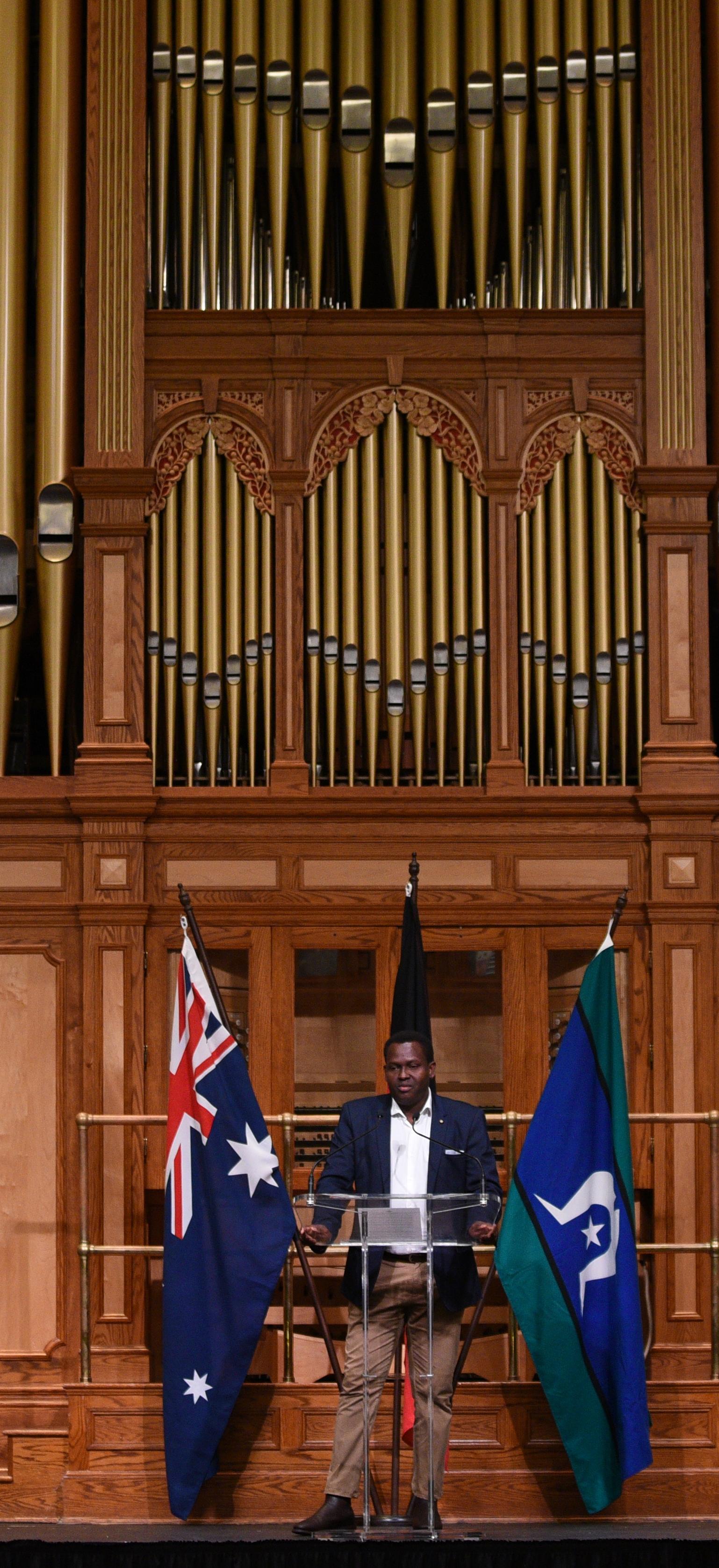
Harmstorf OAM BVK
Treasurer: Silvio Iadarola
Board Members
Gosia Skalban OAM
Rajendra Pandey
Nasir Hussain
Patrizia Kadis
Lenard Sciancalepore
Eduardo Donoso
Manju Khadka
Highlights Talent Beyond Boundaries P4 MCCSA Creative Writing Project P6 South Australian Multicultural Charter P8 Loneliness in Aged Care P12 Young Australian of the Year - Awer Mabil P15 Building Employer Confidence in Disability P18 Strength for Life P23
AUTUMN 2023 | P2
Photo: MCCSA's Ukash Ali Ahmed, guest speaking at City of Adelaide's Australia Day Citizenship Ceremony
FROM THE CEO
HELENA KYRIAZOPOULOS OAM
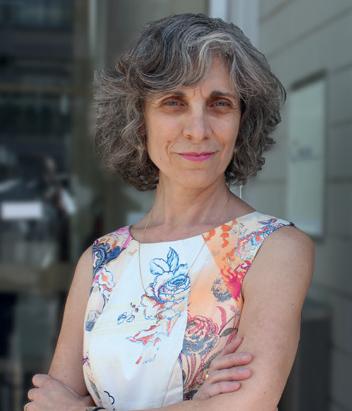
Hello, and welcome to the latest edition of Community Voices! As always, we are thrilled to celebrate the achievements of our Multicultural Community, and in this issue, we are very proud to recognise the finalists of the 2022 Governors Multicultural Awards. These awards recognize the outstanding contributions of individuals and organisations in promoting multiculturalism and cultural diversity in South Australia. It is an honour to acknowledge the achievements of these remarkable people and groups. Congratulations to all nominees, and we look forward to highlighting the work of Aligent, a finalist in the Private Sector category.
At MCCSA, we are committed to providing our community with the information and
resources that they need to participate fully in our society. That's why we will be working closely with the Australian Electoral Commission to ensure that everyone is registered to vote, and understands the process for the upcoming Australian Indigenous Voice Referendum. We believe that education and awareness are key to making informed decisions, and we will be sharing credible links and information to help our community prepare for this important vote.
As always, we are delighted to welcome new staff members to the MCCSA family. We have recently added seven new team members, each bringing their unique skills and expertise to our organization. They will be managing new programs
and helping us to further our mission of empowering our communities, and to create a more inclusive South Australia.
We are saddened to bid farewell to June Lee, our Office Coordinator, who will be relocating interstate to be with her family after five years of service to MCCSA. June has been an invaluable member of our team, and we will miss her professionalism, dedication, and infectious smile. We wish her and her family all the best in their new endeavours.
Finally, on April 25th, we join the nation in commemorating ANZAC Day, a day of remembrance for all Australians and New Zealanders who served and died in wars, conflicts, and peacekeeping operations. We honour their sacrifice and recognize the important role of our armed forces in shaping our history and protecting our hard-earned freedoms.
We hope you enjoy this edition of Community Voices, and you continue to join us in building a more inclusive and equitable society for all.
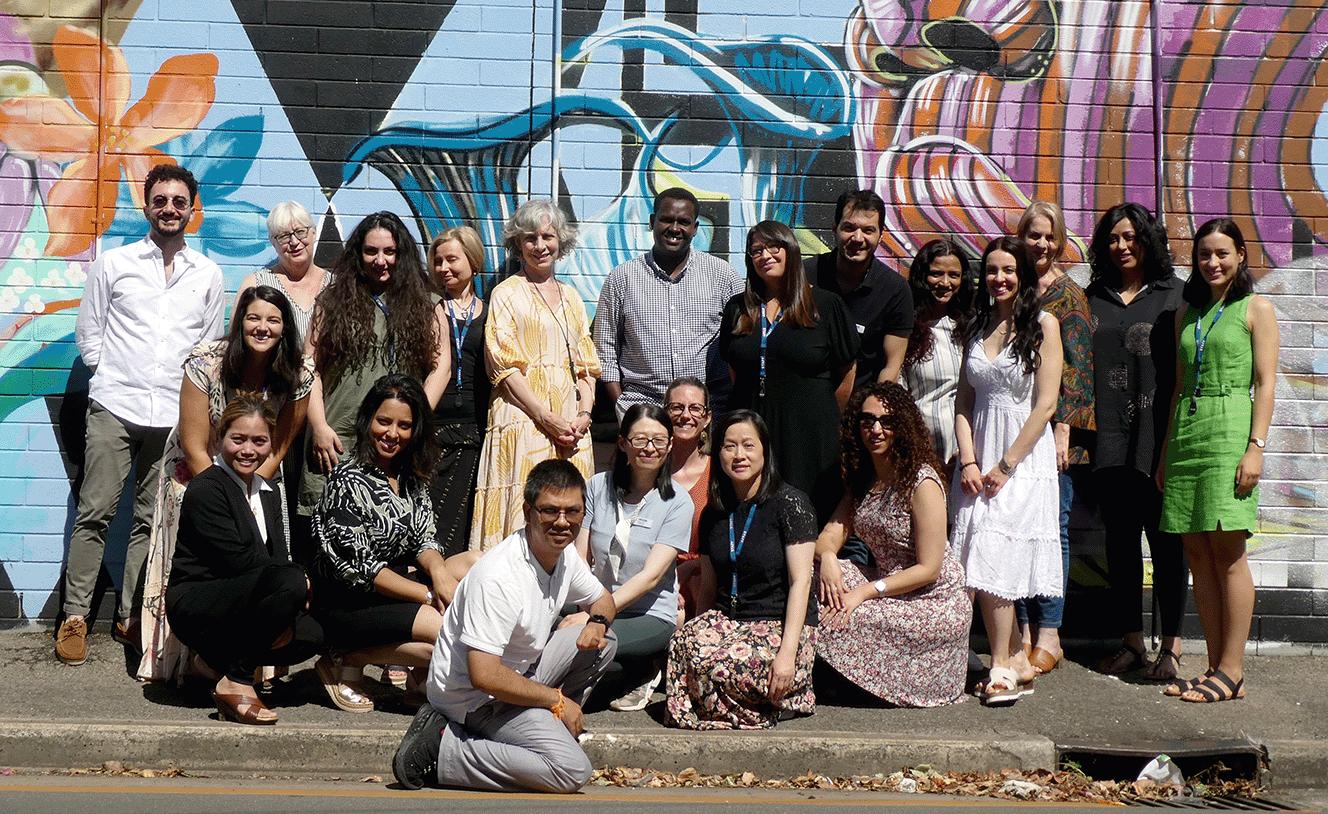
Helena
P3
Photo: The MCCSA team, in front of our SANAA Festival mural
TALENT BEYOND BOUNDARIES Aligent, The South Australian Story
Widespread global conflict in recent years has seen families being displaced from many parts of the world. At the same time, Australia is facing a skills shortage in the workforce.
Global recruitment firm Talent
Beyond Boundaries (TBB) is creatively and compassionately solving both problemshelping displaced refugees from war-torn countries to find new beginnings in Australia while finding highly skilled staff to fill vacancies in Australia’s IT sector.
South Australian eCommerce company Aligent has been proactive and one of the first companies in South Australia to recruit and
sponsor the migration of skilled refugees through the Skilled Refugee Pilot Program. TBB is collaborating with the Australian Government to not only help Australian companies fill their skills shortage, but also to help skilled refugees to settle in Australia.
Aligent Managing Director, Jonathan Day said “Through this program, Aligent was able to search the TBB online job boards when recruiting, enabling us to connect with skilled refugees and displaced people.
“COVID and closed borders saw growth in demand for skilled specialised software and IT workers, we recruited
in Adelaide and invested significantly in local talent but also needed to look elsewhere to meet the demand of Australian businesses,” he said.
“TBB connects employers around the world with refugees who are seeking work. Australian companies like ours, which require specialised skills, are now able to connect with displaced individuals who are looking for employment opportunities, hoping to relocate for work, rebuild their lives, and become valuable members of a new community in a different country.
“The suggestion that refugees place an excessive financial burden on a country by draining public resources is inaccurate, in fact their contributions add great value economically and socially to the wider community, and to our organisation directly.”
Multicultural Communities
Council of SA Inc
Chief Executive Helena Kyriazopoulos said: “Endorsed Australian employers are now able to tap into this overlooked talent pool of skilled professionals and tradespeople, and utilise this Labour Agreement to sponsor skilled refugees to work in their businesses.”
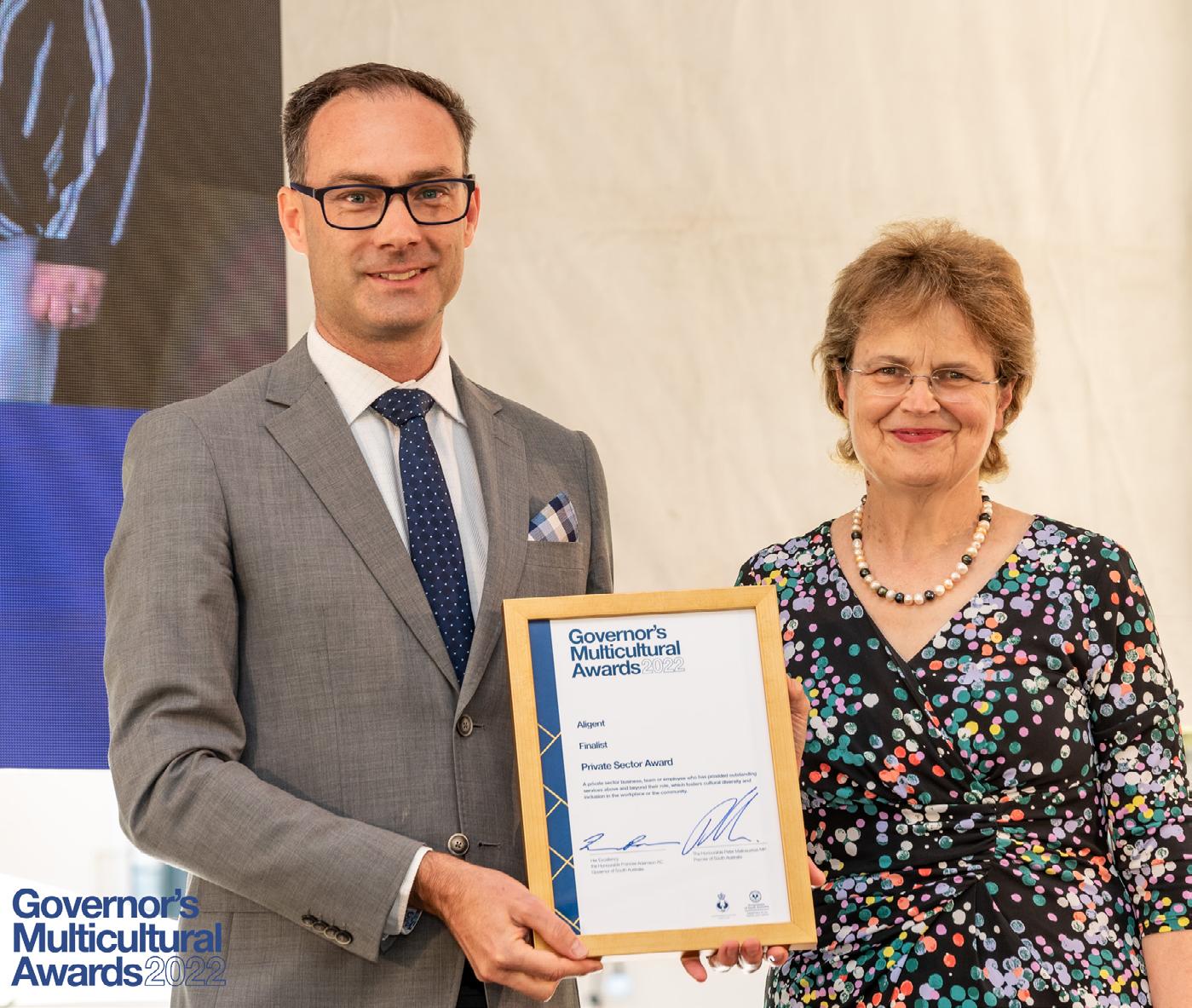
AUTUMN 2023 | P4
Photo: CEO of Aligent, Jonathan Day, accepting the Governor's Multicultural Award from the Governor of South Australia, The Honourable Frances Adamson AC
“This provides a safe migration pathway for thousands of refugees and displaced people over the coming years and assists companies around Australia struggling with a severe talent crunch,” she said.
Through the program Aligent have recruited several employees, including software engineer Sarya who fled Syria in 2012 as a refugee, they offered her not only a job but supported the relocation of her immediate family.

“The scheme assists potential employers and refugees to work together to address the challenges of not having any documentation and proof of work experience as they fled their country since employers can directly assess the skills and vouch for the candidate’s capability” Mr Day said.
“Businesses have direct access to skilled candidates who would be excluded from the traditional migration pathways and visas due to inaccessible documentation, but we can be confident in their skills and work experience,” he said.
“Candidates showcase their skills through performing skills tests and interviewing for highquality roles. We were blown away by the quality of the candidates and have now hired five engineers through the pilot program,” he said
“There is a huge demand from business to trade online and IT staffing has had a hit with closed borders for skilled independent migrants and less skilled graduates.”
“Sarya was selected after a competitive round of online interviews. She has a Bachelor of Information Technology and Engineering from Damascus University and was first introduced to our business in 2020.”
Since 2012 when she fled Syria with her family, Sarya had been living in Amman, Jordan, with her husband, 19-year-old son and 3-year-old twins in limbo with no legal working status, worried that they would be forced back to Syria
A broad range of companies are now able to access the pilot program to hire skilled Syrian,
Afghan and Ukrainian refugees, who are displaced due to conflicts in their countries.
“Our local staff are highly supportive of this program that enables us to improve the lives of vulnerable people, and the initiative is a key part of our broader focus on community and inclusion. This is one more example of how diversity and social contribution makes our business stronger and better suited to the needs and mandates of the modern working environment.” Mr Day said.
Mrs Kyriazopoulos said “The program is also designed to remove some of the barriers that forcibly displaced people face when trying to access employer-sponsored skilled migration pathways.”
Talent Beyond Boundaries works with governments, partners, and the private sector to ensure that refugees have equitable access to skilled migration as a complementary solution to displacement.
Andrea Stylianou Freelance Journalist
P5
Photo: the Aligent team
WRITING MY STORY, MY WAY A creative writing project
MCCSA recently ran a 14-week creative writing course for international students, thanks to a grant from the City of Adelaide.
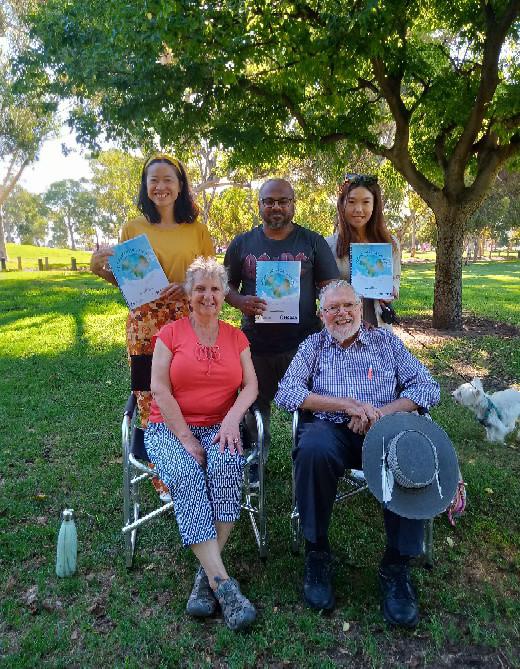
The course, led by experienced volunteer English teachers William and Sylvia Barnes, provided a safe and supportive environment for students from diverse backgrounds to explore and express their personal stories through different forms of writing.
The program emphasized selfreflection, self-expression and cultural awareness, and had a positive impact on students' lives.
At the end of the course, an anthology of stories written by the students was produced, with chapters highlighting cultural themes. Each story in the anthology reflects the writer's experiences and perspectives, demonstrating the power of writing to help individuals express themselves and connect
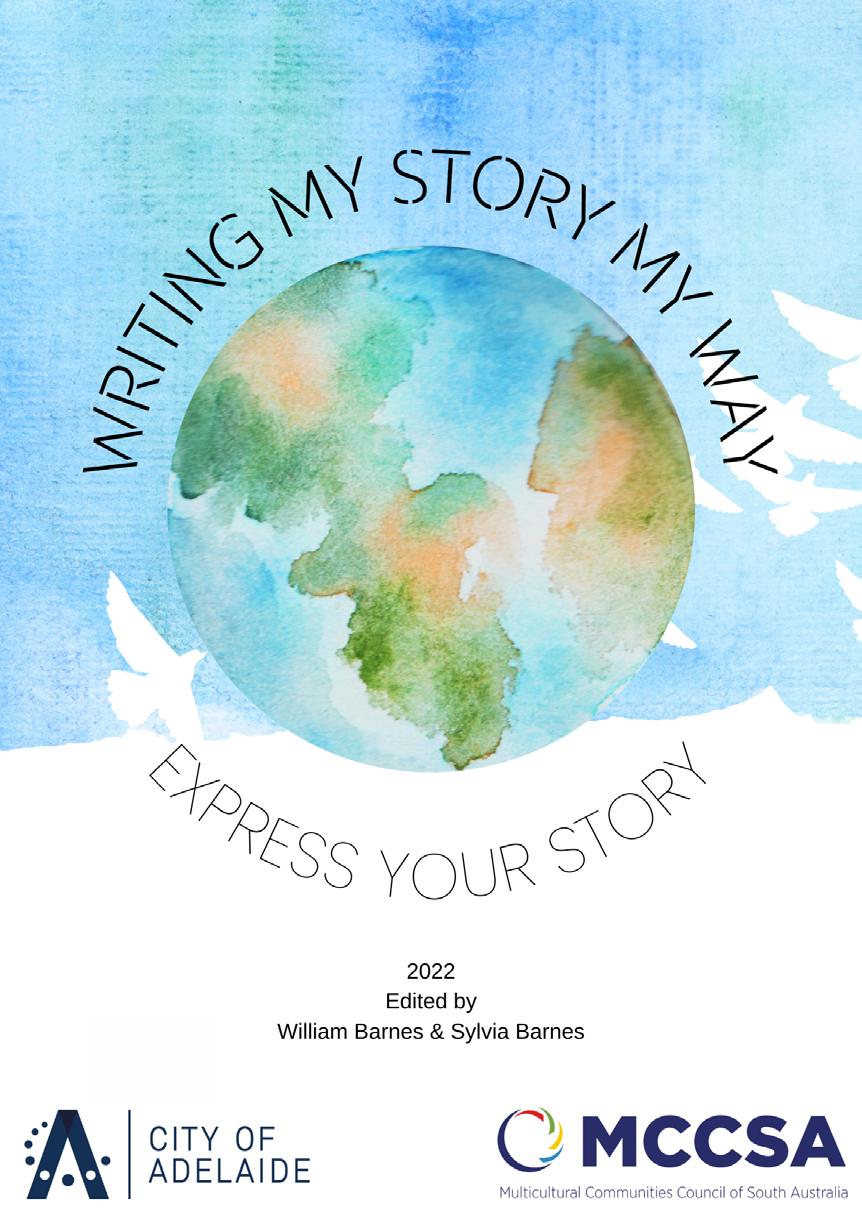
with others. The anthology serves as a valuable keepsake for students to share with their loved ones.
Included here is one of the many standout stories written by the students that entertains and immerses the reader in the writer's culture, family, and traditions.
Contact Stefano Pratola at MCCSA for a digital copy of the Anthology, featuring 22 unique multicultural stories. stefano.pratola@mccsa.org.au
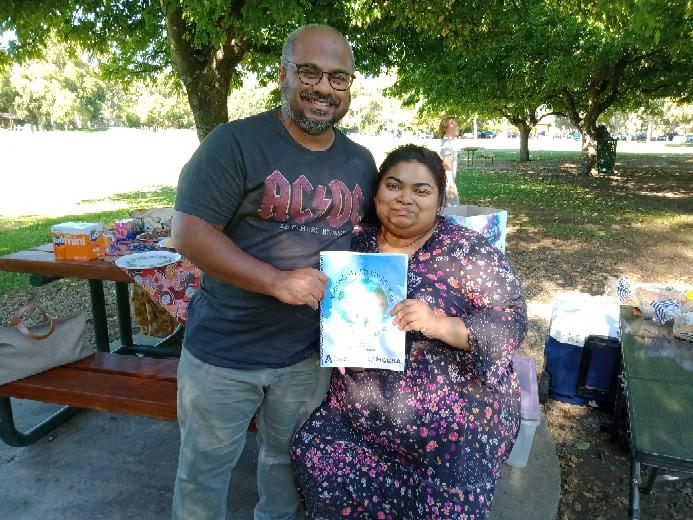
AUTUMN 2023 | P6
Photos: Participants of the Creative Writing Project, and The front cover of the Anthology.
Magical Name
Creative Writing by Lexie Liu
My Chinese name is “Xing”. However, this was not my name when I was born.
When I was born 32 years ago, my grandpa gave me a name of “Jiao”. It means “charming and cute” in Chinese. Seniors always pass their wishes to their descendants by giving names. This time, my grandpa’s wish didn’t come true.
Everything was perfect until I turned 4 months old. I started to cry a lot, even crying for very small things. My crying became more frequent, harder, and unpredictable.
“We need to do something to stop her.” My father said. He then organised a family conference and had my family members together at my grandpa’s house on a dark and glooming afternoon.
Everyone sat quietly around a table in the middle of living room. The clock is ticking on the wall.
“I think her name is the issue,” my dad broke the silence, with a burning cigarette in his fingers. “Because of her name is ‘Jiao”, she is behaving “Jiao”. Her name is guiding and reflecting her behaviours.” My father further explained.

“Jiao” in Chinese also means “acting and behaving in a spoiled manner”. All the rest of my family members looked at my dad and didn’t respond. They had a bit of doubt with this reason but couldn’t think of any other things to explain my strange crying behaviours.
My father smacked his hand down on the table, the cigarette ash fell all over the table. “Let’s just give her a new name.” he said.
“Okay, let’s do it” my grandpa approved of this proposal from my dad and all the other family members nodded their agreement.
My father then stood up and walked around the room. All of sudden, he turned around and shouted out to everyone “Xing, let’s call her Xing, and hope she can do everything well.”
(“Xing” in Chinese means “you can do it well” or “you will do it well”)
“Oh, that’s a good name!” my mum said. Everyone clapped and smiled with this new name.
In one minute, my father gave me a name which I am using for the rest of my life. By giving me this name, he also gave me his wish.
Since I had this new name, I stopped crying a lot.
P7
Photo: Stock Photo "Crop young businesswoman using laptop while drinking tea at home" by Vlada Karpovich (via Pexels)
SA MULTICULTURAL CHARTER Placing cultural diversity at the heart of decision making
South Australia is a vibrant and culturally diverse state that prides itself on its inclusivity and respect for diversity. Now, the South Australian Multicultural Charter takes these values to the next level, through providing a clear set of principles to guide our community towards greater harmony, understanding, and inclusion. Developed through extensive community consultation, the Charter is a simple guide for celebrating, understanding, and including diverse cultures across the state.
Developed in accordance with the South Australian Multicultural Act of 2021, the Charter outlines six principles that will guide our culturally diverse state
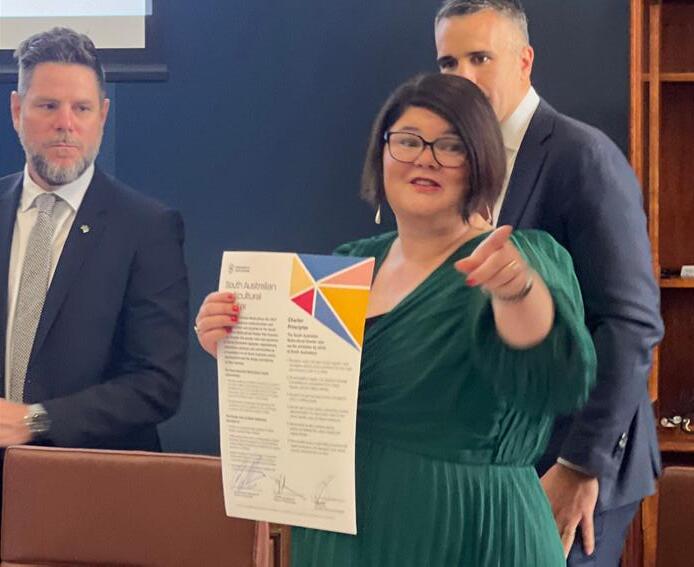
towards a more inclusive and harmonious community. The Charter will provide guidance to South Australian Government agencies, organisations, institutions, businesses, and communities – and be a foundation for all South Australian service delivery, policy, and program development, by placing cultural diversity at the heart of decision making.
The Charter was created through public consultations and contributions from members of the South Australian Multicultural Commission, multicultural organisations, universities, and government officials. Its development reflects the Government's commitment to promoting interculturalism
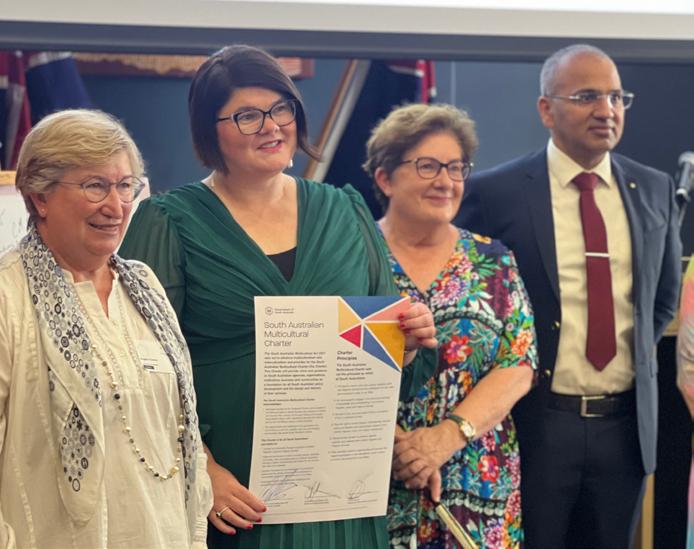
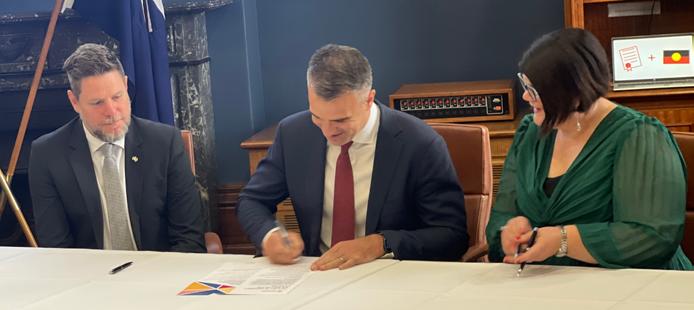

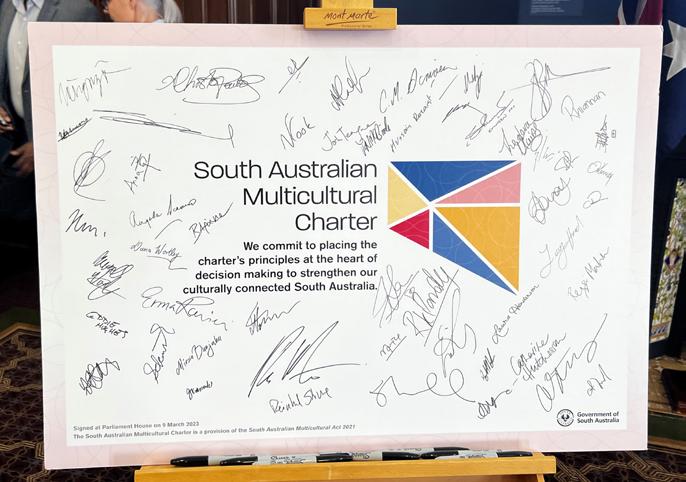
and recognizing the vital role that cultural diversity plays in shaping the state.
As part of the Charter's launch, a Digital Engagement Kit has been created to support communication efforts by providing resources such as a digital copy of the Charter, key messages, and social media assets.
The South Australian Multicultural Charter belongs to all South Australians. Its principles will be instrumental in shaping the future of the state's multicultural society.
Visit www.multicultural.sa.gov. au/charter to learn more about the Charter and to access the Digital Engagement Kit.
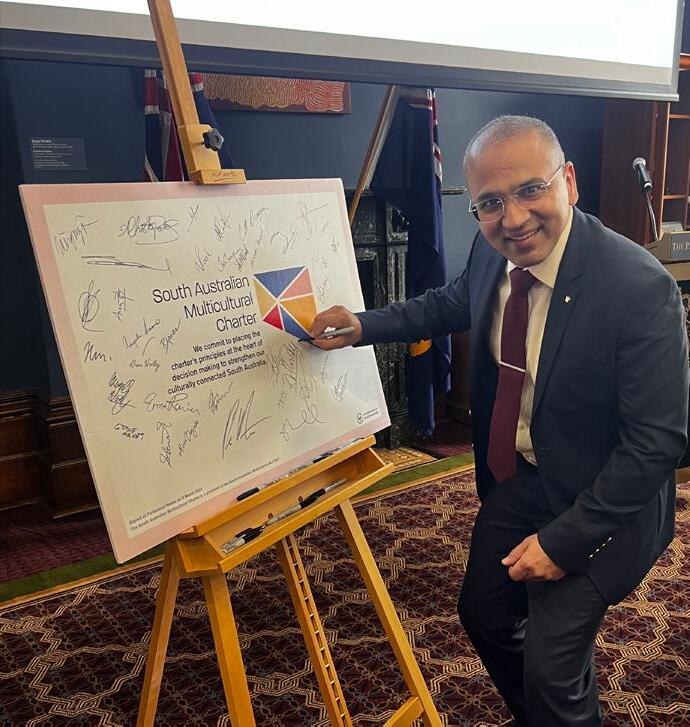
AUTUMN 2023 | P8
Photos: Various shots from the launch of the SA Multicultural Charter

P9
REMEMBERING BRUNO KRŪMIŅŠ
A Pioneer for Multiculturalism in South Australia
Vale Bruno Krūmiņš.
Bruno Krūmiņš, AM, was a remarkable individual who dedicated his life to improving the welfare of ethnic communities in South Australia. Born on July 19, 1924, in Latvia, Bruno migrated to Australia with his family in 1949. He overcame numerous challenges to settle in Australia, and worked tirelessly for the good of the community.
Bruno was the first Lieutenant Governor from a non-English speaking background. He served from 2000-07 as deputy to Governors Sir Eric Neal and Marjorie JacksonNelson.

Bruno was a champion of the Latvian community, and dedicated his life to his vision of seeing Latvia independent
again. Latvian Ambassador to Australia, Margers Krams, praised Bruno for his contributions and recognized him through receiving official recognition from the Latvian Government for his efforts.
Throughout his life, Bruno remained committed to cultural activities, such as singing and music, and Latvian community engagements. He was a founding father of MCCSA in 1979, then known as the Ethnic Communities Council of South Australia, as well as a Board member, and was later appointed an honorary life member of the MCCSA. He also became the inaugural chairman of the South Australian Ethnic Affairs Commission in 1981. Bruno's work helped set the policy framework for multiculturalism in the state.
In recognition of his contributions, Bruno was made a Member of the Order of Australia (AM) for his contribution to ethnic communities, particularly the Latvian community. He was a unique individual who earned the respect of community leaders and government officials for his fair approach and ability to bring disparate parties together to negotiate positive outcomes.
Bruno Krūmiņš passed away on January 1, 2023, at the age of 98. His legacy and contributions to multiculturalism will never be forgotten.
Mrs Miriam Cocking MCCSA Chairperson
Photo: Bruno Krūmiņš
AUTUMN 2023 | P10
ENCOMPASS PROGRAM TRANSITIONS TO CARE FINDER
Multicultural Communities Council of SA (MCCSA) and its EnCOMPASS Connectors provide one-on-one support to older people and their carers from culturally and linguistically diverse (CALD) backgrounds, on how to navigate My Aged Care and access other services.

MCCSA Connectors have identified that cultural stigma, language competency, computer literacy, complexity of the aged care system, trust in institutions and cost of services can prevent older people accessing aged care services and supports.
EnCOMPASS has proved its effectiveness in assisting older people to overcome barriers to becoming more independent and resilient.
At present, MCCSA Connectors support older people, regardless of the complexity of their needs. EnCOMPASS Multicultural Aged Care Connectors Program in its current form will remain active until 30 June 2023, then transition to the Care Finder Program, designed to support people with more complex needs.
Care Finder offers a national, face-to-face network of care finders. It provides support
for older people to interact with My Aged Care, access aged care services and other community resources. Find out more about the Care Finder Program by visiting www. health.gov.au/our-work/carefinder-program
The EnCOMPASS program is primarily geared towards older people speaking Italian, Greek, Cantonese, and
delivering EnCOMPASS in the Riverland, as well as in metropolitan Adelaide (east, south and west).
MCCSA delivers the EnCOMPASS project in partnership with the Federation of Ethnic Communities Councils of Australia (FECCA) and under funding from the Commonwealth Department of Health and Aged Care.
Mandarin; however, those who speak other languages are encouraged to get in touch and MCCSA will gladly provide qualified interpreters for the language speaker living in any of their serviced areas. Since the beginning of the project, MCCSA has supported people speaking languages including Arabic, Hindi, Russian, Spanish and Vietnamese.
MCCSA has recently widened its service areas and is now
MCCSA encourages older people speaking languages other than English, their families and carers to contact MCCSA Connectors prior to 30 June 2023, to find out more about the EnCOMPASS program and available assistance.
For more information, contact MCCSA’s EnCOMPASS Connectors. Call MCCSA on 8345 5266 or email mccsa@ mccsa.org.au.
P11
Photo: Stock photo "Older man and woman having lunch outside together"
WHY DO MORE PEOPLE FEEL LONELY? A study by Torrens Univsersity Australia
The experience of loneliness can be a part of life for different reasons. Sometimes it can be for a short period, while other times it can be an extended period, which can cause issues for all of us. The World Health Organization (WHO) has been alerting people about loneliness for a while now, and after COVID-19, in partnership with the United Nations (UN), has been prioritizing interventions to ensure this issue is addressed, especially among older people (WHO, n.d).
It is well-known that we are social beings who, since our early years, are dependent on groups for survival and development. When social connections and support are lacking, it can have an impact on people’s health and wellbeing. Research has shown that loneliness can lead to a range of health and well-being issues, including mental health (WHO, 2021).
It is well known that there are some life events that are more likely to make older people feel lonely, such as retirement,
loss of friends and partners, and being away from family. Being a migrant can add to a sense of loneliness, especially when English is spoken as a second language, making it more difficult to meet people and socialise in local areas (Johnson et al., 2019).
In Australia, 38% of people aged 65+ were born overseas, and it is expected that this percentage will increase rapidly in the next 30 years. Consequently, we need to understand the views of older migrants, especially how to deal with loneliness, something that can occur at different life stages and negatively impact their social and health life (ABS, 2021).
To contribute to this area of research Torrens University Australia's study addresses loneliness in older migrants who live in Adelaide. They aim to better understand the needs of migrants who come from countries where English is not the first language. They hope their research will result in recommendations that potentially bring about change
in this area and advocate for better health and well-being outcomes for this important population group.
If you are an older migrant over 65 years old, and you came from a Culturally and Linguistically Diverse background, or know someone with these characteristics, Dr Marcella Meneguello from Torrens University Australia invites you to check out their website by using the QR code below or emailing to marcella. meneguello@torrens.edu.au.
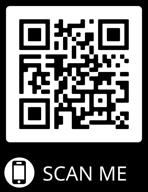 Dr Marcella Meneguello Master of Philosophy candidate in Public Health Torrens University Australia
Dr Marcella Meneguello Master of Philosophy candidate in Public Health Torrens University Australia
References:
WHO (2021).
WHO (n.d) https://www.who.int/initiatives/decade-of-healthy-ageing Johnson et al. (2019) https://doi.org/10.1108/IJMHSC-10-2018-0067 ABS (2021) https://www.abs.gov.au/statistics/people/population/migration-australia/latest-release#media-releases AUTUMN 2023 | P12
https://www.who.int/publications/i/item/9789240030749
ConnectingGenerations
The Importance of Social Interaction in Aged Care
Loneliness is a serious issue facing many elderly Australians, with over 1 million individuals aged 65 years and above experiencing this on a regular basis.
One way to combat loneliness is through the Community Visitors Scheme (CVS). The Community Visitors Scheme (CVS) offers a way to combat loneliness among the elderly. The Australian Governmentfunded program has been providing companionship and friendship to older people in aged care facilities or at home through MCCSA for over three decades. Since the scheme's establishment in South Australia in 1989, the program has been supporting vulnerable older people who speak languages other than English and reducing loneliness and social isolation among them.
Volunteers are the backbone of the CVS, providing a free service visiting residents at least twice a month. These visits aim to help elderly people
establish social connections and develop new friendships through various activities such as sharing stories, watching TV, cooking and sharing food, and playing games. CVS volunteers have even helped residents learn how to use technology to stay connected with their families and friends.
The CVS is particularly crucial for vulnerable older people who have few or no family members in South Australia, and those whose friends may have passed away or are unable to travel. CVS visits can make a positive difference in people's wellbeing and improve their quality of life by reducing isolation and providing a sense of community. Additionally, CVS volunteers provide crucial feedback on the residents' wellbeing, ensuring their safety and happiness.
The CVS is especially important for those living in aged care facilities where no one else speaks their language. These residents are at a higher risk
of social isolation, which can lead to depression, anxiety, and other mental health issues. The CVS volunteers who speak the same language as these residents provide a muchneeded connection to their home culture and language, which can be a source of comfort and joy.
The Community Visitors Scheme will be renamed as the ‘Aged Care Volunteer Visitors Scheme’ (ACVVS) on a national level from July 1st, 2023, following a suggestion by the Royal Commission into Aged Care Quality and Safety.

Volunteers are essential to the success of the scheme, and more volunteers are always needed to provide support.
To become a CVS volunteer, interested individuals can contact MCCSA for more information via email: mccsa@ mccsa.org.au or phone (08) 8345 5266. Together, we can make a difference in the lives of those who are at risk of social isolation and loneliness.
P13
Photo: Stock photo "Elderly man filling agreement papers with social worker at home" by JackF (via Getty Images)
REGULAR BREAST SCREENING IS LIFE SAVING
When was your last mammogram?
Participating in regular breast cancer screening is one of the most important decisions a woman can make to remain in good health. BreastScreen SA provides a free breast screen for all eligible women every two years, it takes just 15 minutes and can detect breast cancer at an early stage before it can be felt.
Breast cancer is the most common cancer diagnosed in women and statistics show that women from culturally and linguistically diverse (CALD) backgrounds participate in screening at lower rates than other women. Regular breast screens, every two years can help to detect breast changes early, helping to make treatment simpler and more successful.
The main risk factors for breast cancer are being a woman and getting older with 75% of cases being diagnosed in women over 50. A screening mammogram is an X-ray of the breasts, performed at a BreastScreen SA clinic by a female radiographer. An appointment only takes 15 minutes and is free. All women aged 40 and over can book a free breast screen, but it is particularly important for women aged between 50 and 74 years.
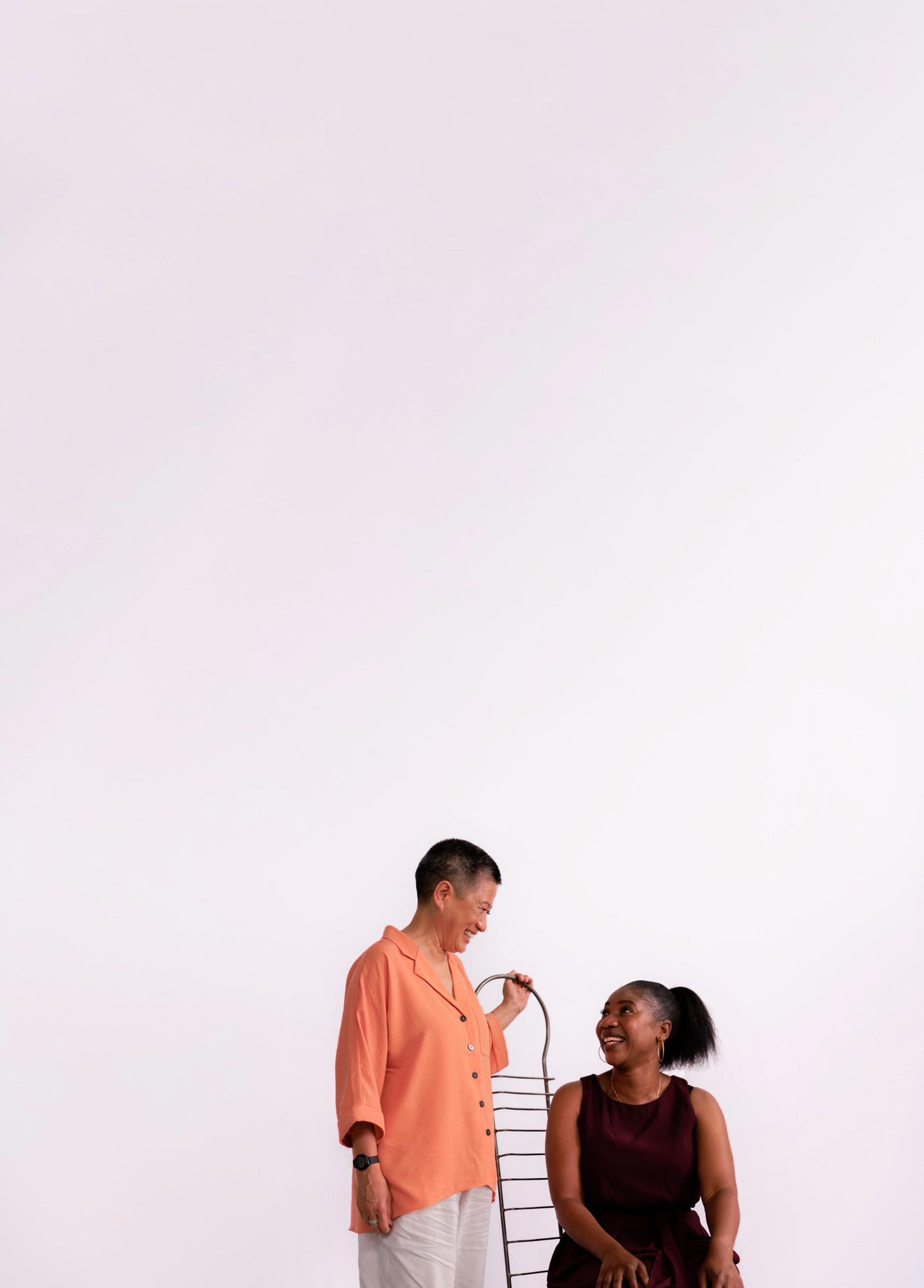
Having a breast screen every two years ensures that breast changes can be detected early.
When was your last mammogram? If your breast screen is overdue, you can phone BreastScreen SA on 13 20 50 to make an appointment. If you are unsure, you can phone and ask when your next mammogram is due. Women can also choose to visit the website at www.breastscreen. sa.gov.au and request a call back to make an appointment. Phone and face-to-face interpreter services are also available at no cost.
BreastScreen SA support CALD women to access the program through organising smaller group bookings and female interpreters for clinic appointments. Requests for information sessions and
attendance at cultural events and festivals can be made, so that members of your community can learn more about breast cancer and the screening program. For more information, contact Marita Aldridge, CALD Project Officer, on 8274 7169 or at marita. aldridge@sa.gov.au
In getting back to normal following the pandemic it is vital to check on your breast health. Don’t delay your screening appointment; contact BreastScreen SA today to check the date of your last mammogram and make your appointment.
Phone BreastScreen SA on 13 20 50, or visit www.breastscreen. sa.gov.au to find out more.
AUTUMN 2023 | P14
Photo: Two women smiling at each other (provided by BreastScreen SA)
Awer Mabil Young Australian of the Year
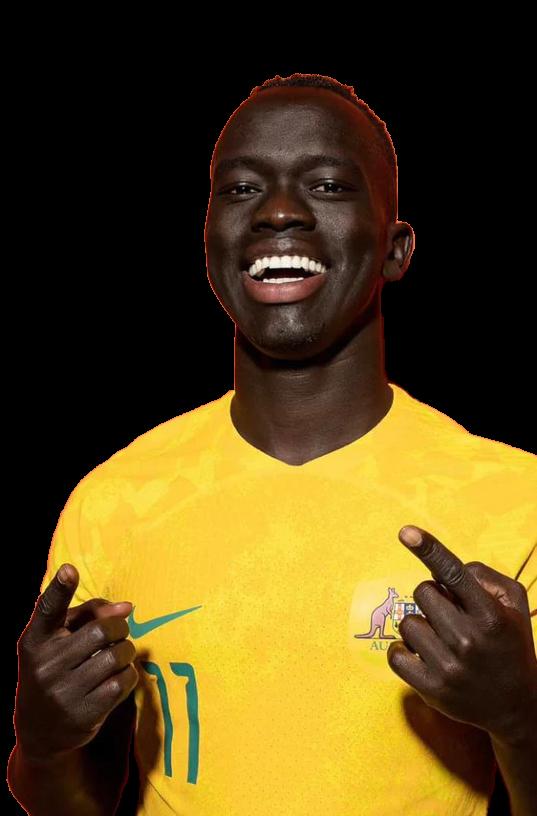
The MCCSA community is honoured to recognize the remarkable achievements of Awer Mabil, a 27-year-old soccer player who has made a significant impact on and off the field. Mabil is one of Australia's finest soccer players, having played in a World Cup for the Socceroos, and is currently playing club football in Spain.
Mabil's achievements and remarkable journey to success have earned him the title of Young Australian of the Year. Born in the Kakuma refugee camp in Kenya, Mabil and his family fled the civil war in Sudan to start a new life in Australia when he was just 10 years old. It was in Australia that Mabil discovered his love for soccer, and he quickly rose to become one of the country's top players.
Mabil's success on the field is impressive, but it is his work off the field that truly sets him apart. He co-founded the Barefoot to Boots charity, which supports refugees who live in camps like the one he grew up in. The charity started with Mabil returning to Kakuma with 20 football shirts but has since expanded to also focus on health, education, and gender equality initiatives.
In January this year, Mabil was awarded the Young Australian of the Year for his outstanding contributions to the community. Although he was unable to attend the ceremony due to team commitments in Europe, his mother Agot Dau Atem and uncle Michael Matiop Atem accepted the award on his behalf in Canberra. In his acceptance message, Mabil said that he was motivated to help others after he was given a helping hand in Australia.
Mabil's dedication to giving back to his community through the Barefoot to Boots charity is testament to his character and his desire to help others. His experience of hard times, the loss of his dear sister in 2019, and the knowledge that young people see him as a role model have only driven him to perform better. He has said that what he does on the field is what he wants to be known for, not his background.
Mabil's story serves as an inspiration for children and young people to believe that they too can achieve their dreams, no matter how challenging the journey may be. The MCCSA community congratulates Mabil on his accomplishments and wishes him continued success in all his future endeavours.
P15
Photo: Awer Mabil (via Getty Images)
MEET SOME OF THE NEW FACES AT MCCSA
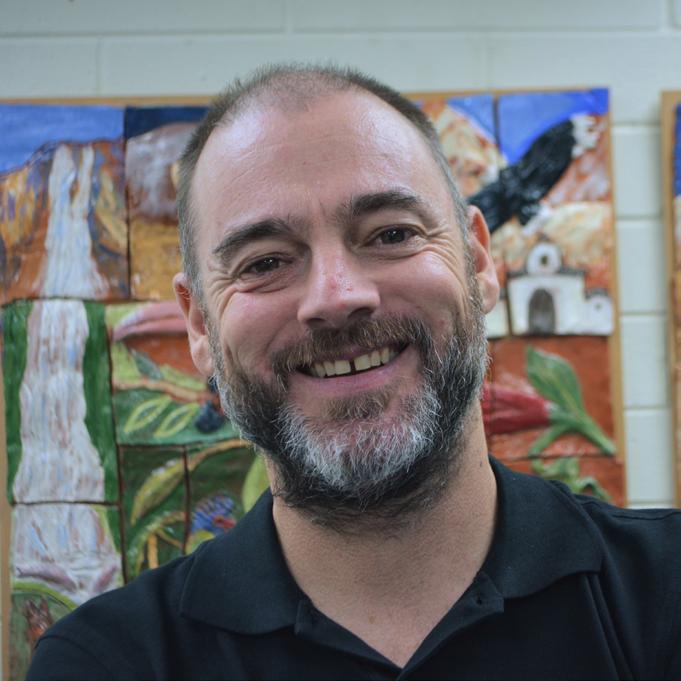
Veronica Davila is a dedicated and creative individual with a passion for community engagement and social justice. Veronica hopes to help enhance MCCSA’s reach and impact, with experience in project management, media relations, and graphic design. She has multiple degrees, including Occupational Therapy from UniSA, Communications and Media from UniSA and an advanced diploma in Graphic Design from TAFE SA. Veronica is wellequipped to provide a fresh and innovative approach to the MCCSA's communication strategies. She is excited to collaborate with the team and engage with the diverse communities that MCCSA supports.
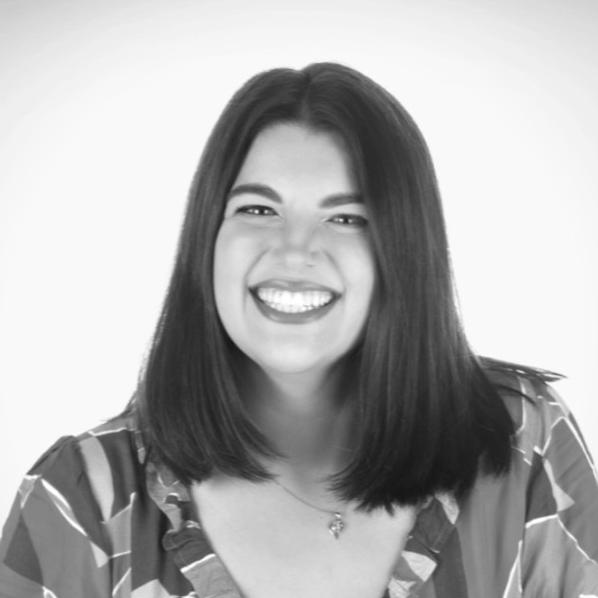
GEOFFREY BROWN Transport Coordinator
Geoffrey Brown was born in Glenelg, South Australia, and has also lived and worked in England, Scotland, New Zealand, and Germany where he learned the German language. Before joining MCCSA, Geoffrey worked for over 20 years in the community/not-for-profit sector and has experience working within practical conservation (volun-tourism), the employment sector, and with refugees from Syria and Afghanistan while in Germany. Geoffrey holds an Honours degree in Biology and a Bachelor of Ecotourism from Flinders University in South Australia. He is happiest when he is out birdwatching or riding one of his many bicycles.
PERRIN ABBAS Inclusive Employment Consultant
Perrin Abbas' life took her from India to Dubai over 2 decades ago and then brought her to Adelaide in 2018 where she continued working in learning and development and coaching within corporates before Community Services came calling.
Along with a Masters in Sociology, she has a degree in political science and psychology as well as a coaching certification from the International Coaching Federation (ICF). Perrin has been teaching Yoga and Meditation for over 10 years in Dubai and now in Adelaide. Classes are free and inclusive. In her free time, she scours the city for good Thai restaurants.
 VERONICA DAVILA Communications Officer
VERONICA DAVILA Communications Officer
AUTUMN 2023 | P16
George Gouzounis migrated from Greece to Indonesia a little over a decade ago, before settling in Australia where he has been working in the ageing, disability and community services space. He holds a PGCert in Health Science from Western Sydney University and his prior studies include intercultural policies, marketing and advertising, and international studies. George volunteers as Grievance Officer with SA Sea Rescue Squadron and he is also a dance teacher, having taught to almost all ages and abilities.

At MCCSA, Omar Ahmad works on a project designed to build employer confidence and inclusion in disability. In 2010, Omar migrated from Iraq to Australia. With over 20 years of experience both inside and outside Australia, Omar has worked in several industries, including engineering, education, services, notfor-profit, and the disability services sector. He holds a bachelor's degree in agriculture science from the University of Baghdad, a Diploma of Early Childhood Education and Care, and a Diploma of Interpreting from TAFE SA.
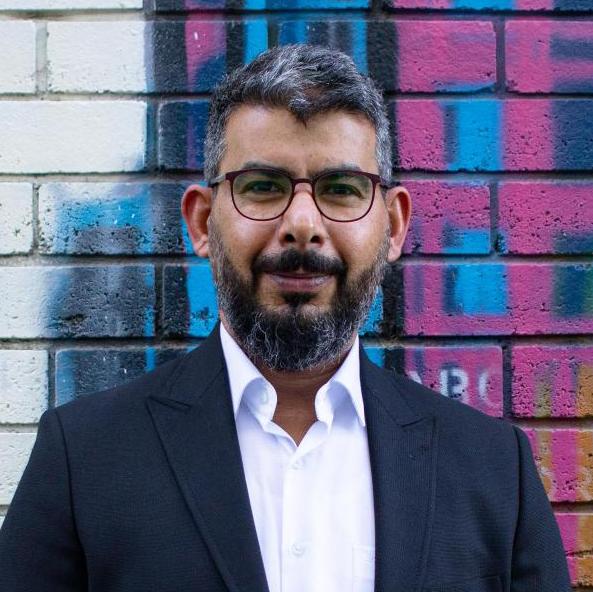
FLORENCIA LEIRIA Project Officer
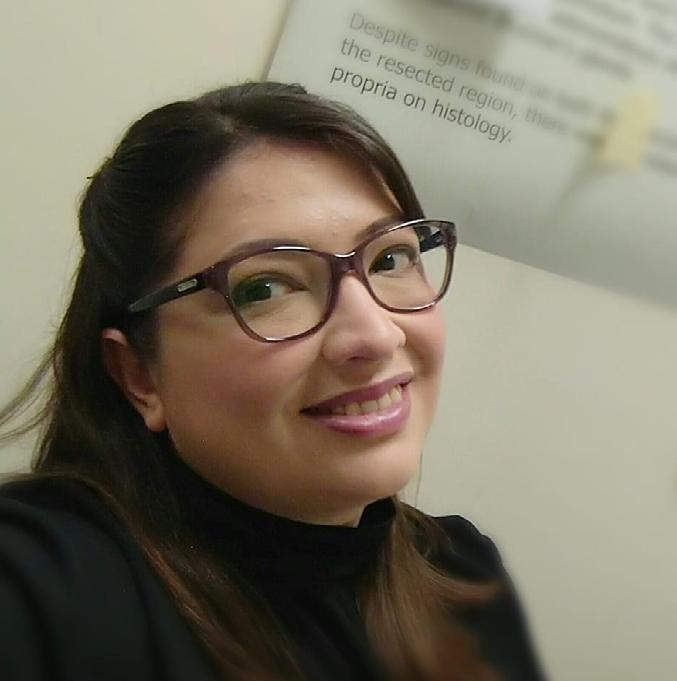
KATHERINE GREER Disability Programs Coordinator
With a passion for creating positive impact in people’s lives, Katherine Greer pursued her studies in Development Studies and International Studies. She spent the last 10 years working with culturally and linguistically diverse communities in Australia and overseas, and the last 5 years in the Disability and NDIS Sector. In addition to her work at MCCSA, Katherine owns her own business practising as a Kinesiologist, helping others achieve greater health and wellbeing. In her free time, she enjoys exploring different cultures through music, dance, food and travelling the world.
Florencia Leiria is an Argentinian professional with a medical background and fluency in both Spanish and English. She has over 10 years of experience working in the public health sector in Argentina and holds a Master's degree in Public Health. At MCCSA, Florencia focuses on activities related to health, social support, and wellbeing. Her dedication to public health has driven her to make a positive impact on the communities she serves.
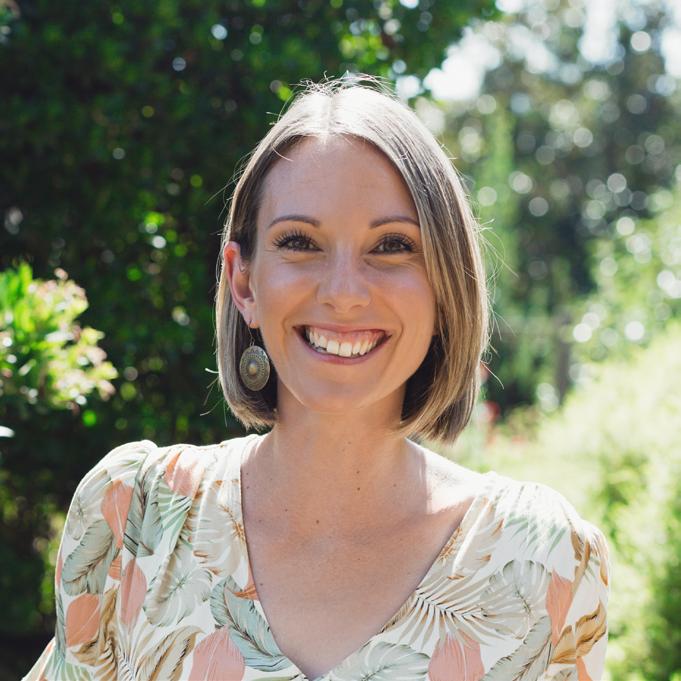 GEORGE GOUZOUNIS CHSP Sector Support and Development Coordinator
OMAR AHMAD Inclusive Employment Officer
GEORGE GOUZOUNIS CHSP Sector Support and Development Coordinator
OMAR AHMAD Inclusive Employment Officer
P17
CHANGING CORPORATE MINDSETS
Diverse Workforces Drive Innovation and Profitability
In recent years, there has been a growing awareness of the need to promote greater inclusion and diversity in the workplace, including in the recruitment and retention of culturally and linguistically diverse (CALD people with disabilities (PWD). While progress has been made, there is still much work to be done to change corporate mindsets and promote greater disability recruitment.
One way to change corporate mindsets is through education and awareness-raising. Employers need to be educated about the benefits of disability recruitment, and the support that is available to help employees with disabilities succeed in the workplace. This includes providing training for managers and staff on disability awareness and inclusion, and promoting the positive experiences of employees with disabilities.
It is important to recognise that disability recruitment is not just the right thing to do, it also makes good business sense. Available research has shown that companies with more diverse workforces, including people with disabilities, are more innovative, productive, and profitable.
CALD people with disabilities bring unique perspectives and experiences to the workplace, which can contribute to a more inclusive and innovative workplace culture. There is increased cultural competency which can improve communication and collaboration with clients and customers from diverse backgrounds.
Employers can tap into new markets and customer segments, by providing insights and connections to communities that may have been previously untapped.
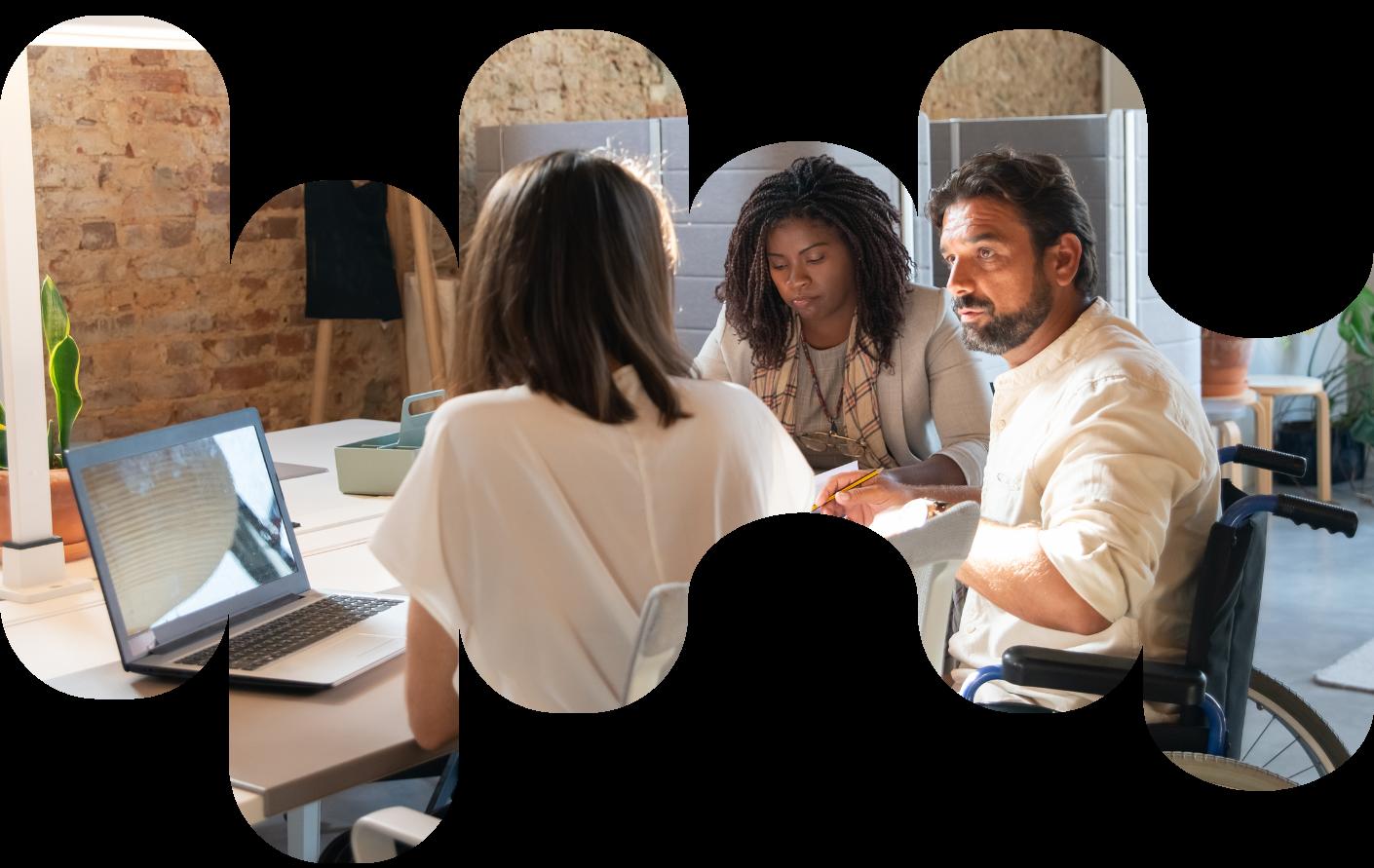
Employers who hire CALD people with disabilities demonstrate a commitment to diversity and inclusion which can improve their reputation and social responsibility.
A new initiative by the Multicultural Communities Council of South Australia (MCCSA) and funded by the Federal Government aims to help employers build confidence and inclusion in disability and to bridge the gap between people with a disability from a culturally and linguistically diverse background and corporates.
For more information, please contact MCCSA’s Inclusive Employment Consultant, Perrin Abbas perrin.abbas@mccsa. org.au
By working together, we can create a more inclusive and equitable society for all.
AUTUMN 2023 | P18
Photo: Stock photo "People having a meeting in an office" by Kampus Production (via Pexels)
AUSTRALIAN REFUGEE ASSOCIATION WINS OFFICE FOR AGEING WELL TACKLING AGEISM AWARD
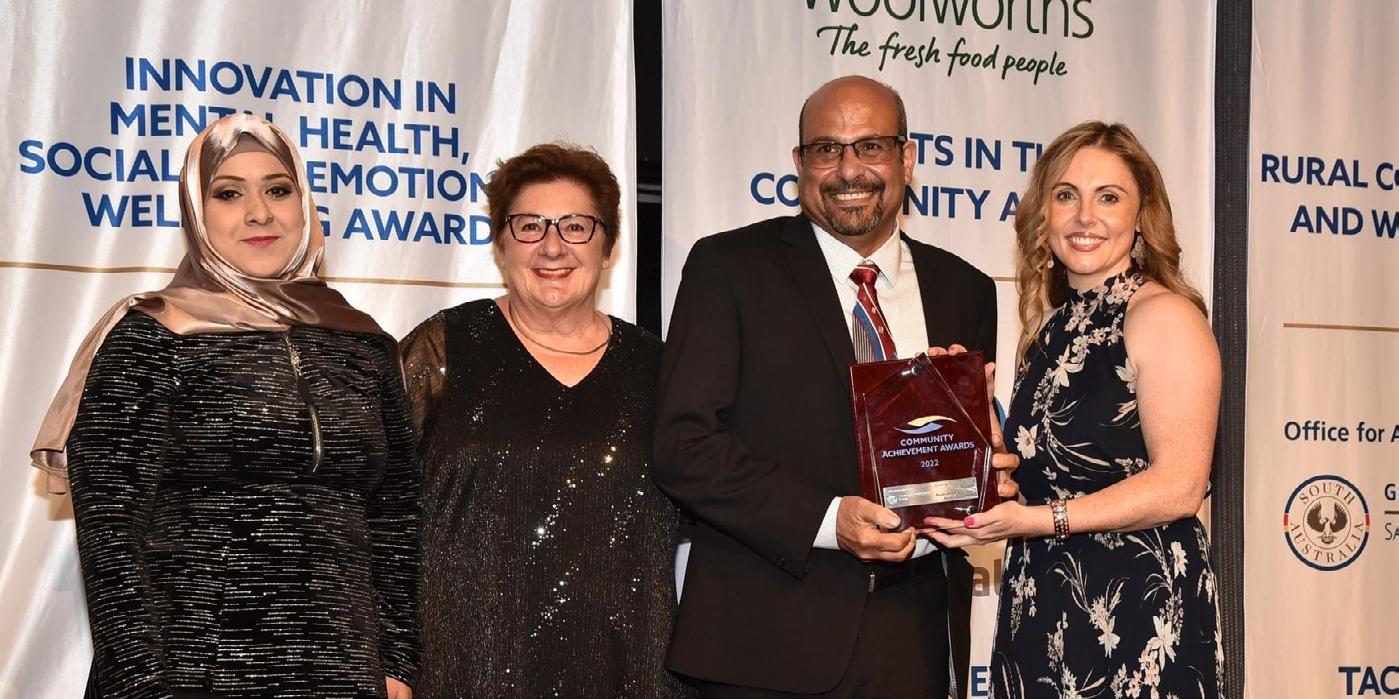
Office for Ageing Well has presented its Tackling Ageism Award 2022 to the Australian Refugee Association (ARA) for working to support refugees and migrants to actively participate in the wider community.
The Australian Refugee Association (ARA), operating in Salisbury, Torrensville and Mitchell Park, was recognised for its commitment to tackling ageism through its Zimala Project, which means ‘fellowship’ in Arabic.
The project has supported more than 100 men aged 50 and over with Syrian, Afghani, Hazara, Pashtun, and African refugee and migrant backgrounds to stay active and engaged in the community through cultural and social experiences and support.
It promotes inclusion by connecting the men with health and government services information and offering social opportunities such as trips to parks, community gardens, and excursions to the beach and fishing.
This helps to overcome loneliness and tackle ageism head-on by linking the men
to the wider community and empowering them to share their wisdom, knowledge, and experiences despite varying cultural, social, and economic backgrounds.
During the COVID-19 pandemic, ARA adapted the project to include digital communications such as WhatsApp and worked to turn around attitudes to vaccines by presenting facts to replace hearsay and opinions spread through social media.
The Zimala Project has been such a success with Arabicspeaking men that ARA has now opened it up to the broader community.
Office for Ageing Well’s Acting Executive Director Ms Cassie Mason presented the Tackling Ageism Award to ARA at the
South Australian Community Achievement Awards in December last year.
“Office for Ageing Well is greatly encouraged that such diverse organisations and individuals are taking action to challenge ageism and better promote the value of older people and ageing well.”
“I congratulate all 22 Award nominees, including our other finalists, Embraced Incorporated, The Art Bus, Mindset for Life and the Kapunda Senior Citizens’ Club,” said Ms Mason.
Tackling Ageism is a key Enabling Factor of South Australia’s Plan for Ageing Well
2020-2025
For more information, go to www.sahealth.sa.gov.au/ tacklingageism
Photo L-R: Marwah Salman, Case Manager, ARA; Deb Stringer, Chief Executive Officer, ARA; Mohsen Abdel-Saleh, Community Education Coordinator, ARA; and Cassie Mason, A/Executive Director, Office for Ageing Well. Image provided by Awards Australia.
P19
Australian Refugee Association (ARA) delivers the Zimala Project to tackle ageism by bringing together and empowering older men in refugee and migrant communities. The Project connects people with organisations such as health information lines and government services. It also provides opportunities to explore new hobbies and connect through social games. There have been 15 excursions or group activities with 100 people attending so far.
ActNow Theatre
Tackling Social Issues through Interactive Performances
ActNow Theatre is a theatre company based on unceded Kaurna Land, just around the corner from MCCSA, on 253 Gouger Street!
This not-for-profit organisation develops interactive, thoughtprovoking performance projects that engage and challenge audiences by unpacking contemporary social justice issues.Their work is democratic and participatory and aims to make education engaging, activism invigorating and citizenship empowering.
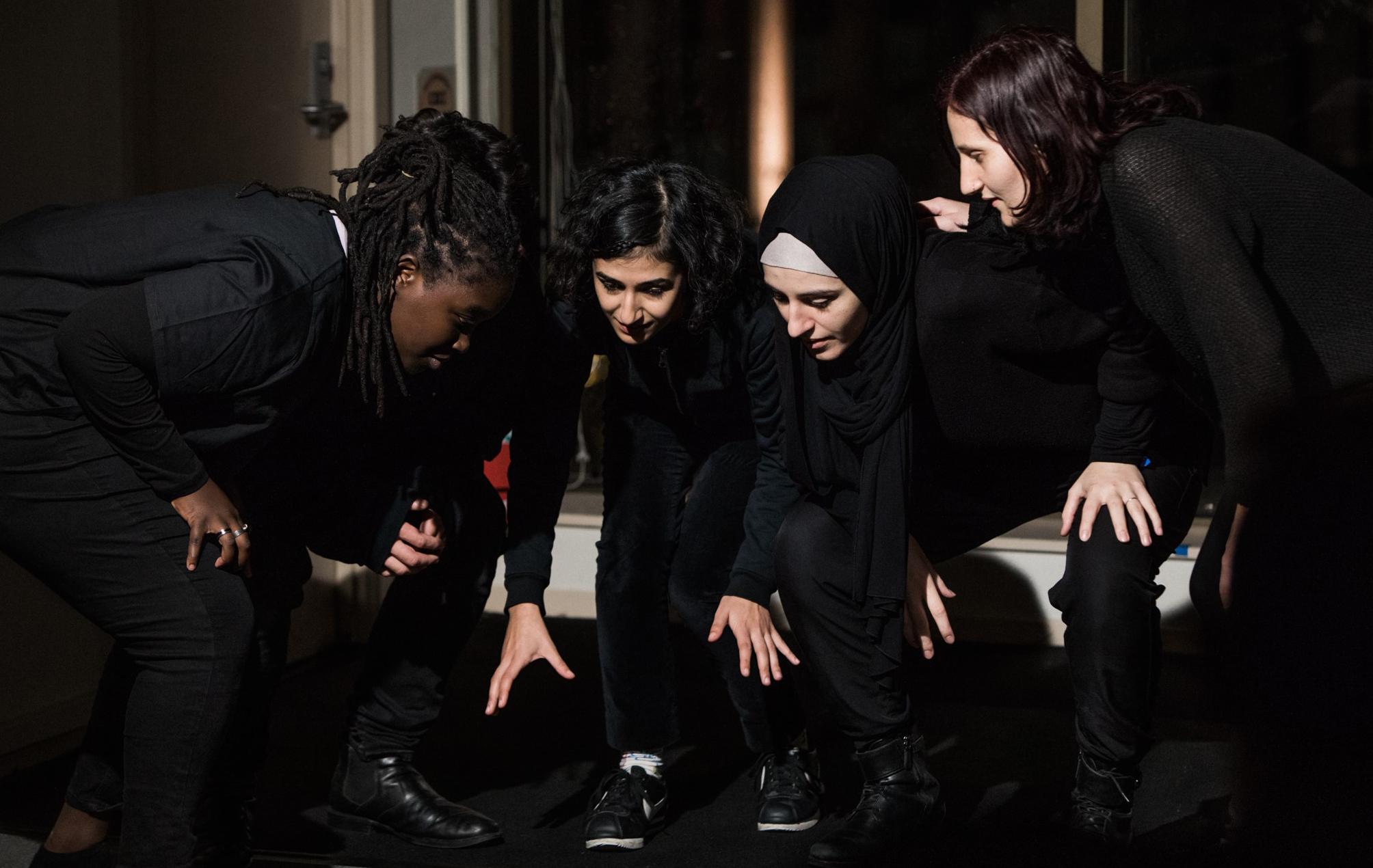
ActNow Theatre has collaborated with organisations within and outside of the arts. For instance, their Decameron 2.0 project that was delivered in partnership with State Theatre Company of SA and
brought together over 100 artists to create 10 weeks of new stories and offset the impact of COVID-19 on the industry.
Their other past projects have explored subjects such as racism, Islamophobia, climate change and sexual assault and have been presented in theatres, schools, workplaces, healthcare setting and community spaces. These shows have been commended in South Australian Parliament, praised by audiences, participants and community organisations, and ActNow Theatre’s contribution to the South Australian arts landscape has been recognised by a number of awards.
It is ActNow Theatre’s mission
to decolonise the arts and create space for diverse storytelling. They amplify the voices of traditionally marginalised communities and enable artists to tell their own stories in their own way. In addition to producing theatre, ActNow Theatre offers funded opportunities for the creative and professional development of First Nations artists, artists of colour and artists who identify as LGBTQIA+.
Each week, they hold free theatre workshops designed to cater to members of their diverse communities and they are always looking for new participants. Check out their website www.actnowtheatre. org.au or email info@ actnowtheatre.org.au for more information.
(photo supplied by ActNow Theatre) AUTUMN 2023 | P20
Photo: People performing
SAPNAM
The South Australian Professional Networking Association for Migrants (SAPNAM) started as a virtual group in June 2016, when a group of Adelaide migrants and non-migrants teamed up to help more recent arrivals to Adelaide find work in their field.

The group’s ethos was inspired by gratitude and the desire to ‘pay-forward’ the help that many had received when they arrived newly to Adelaide, or had been a stranger in another country. SAPNAM has no hierarchy, formal structure, has deliberately decided to be self funding and is committed only to matters of employment support. It helps reduce the early frustration that is experienced by many migrants in finding professional work in a new country and culture.
The SAPNAM team: "In 2016 until the pandemic, people with tremendous experience and skill were struggling to access the Adelaide workforce due to lack of easily taught inter-cultural literacies. Skilled workers were also excluded due to being erroneously categorised as ‘temporary visa holders’ along with tourists and students. There was much general information available
about written applications, but there was little or no mentoring."
SAPNAM saw this need and started small group sessions once a month with the support of the Multi-Cultural Communities Council of SA. The group grew rapidly and it now has over 1900 members, most of whom are active and supportive. The Telegram group is space to share jobs, find mentors and advice, but the strength of SAPNAM is the one-to-one conversations, drawing on specific cultural knowledge to identify where an applicant needs help.
large network of willing-tohelp professionals in project management, engineering, academia, banking and finance, health and particularly all the variations of IT work. The monthly forums focus on one of these areas, using recruiters and experts in writing applications and resumes.
Over seven years SAPNAM has helped hundreds of new migrants, into work by connecting them to employers and mentors and has personally workshopped hundreds more written applications and walked others through interview techniques. Many people who have been helped by SAPNAM have in turn helped others into jobs. SAPNAM says: "The goodwill migrants bring to Australia is a huge resource, we have to preserve it for the sake of future resilient, supportive and healthy communities."
If interested feel free to use the links to join SAPNAM:
• https://t.me/joinchat/ HjIf7A6TsiVajAl8HuVr4Q to join SAPNAM on Telegram
SAPNAM believes it has become Australia’s largest free and voluntary employment support group for migrants. It has built a strong and
• https://www.linkedin.com/ groups/13884379 to join SAPNAM on LinkedIn.
• www.sapnam.org
Helping new migrants find meaningful employment
" The migrantsgoodwill bring to Australia is a huge resource.
We have to preserve it for the sake of future resilient, supportive and healthy communities. "
P21
Photo: Stock photo "People Near Table - Collaboration" by Fauxels (via Pexels)
'GOING PLACES' MCCSA's Affordable Transport for Community Outings
'Going Places', MCCSA's transport service, provides reliable and affordable transportation to community organisations and individuals across South Australia.
With four buses, including one wheelchair-accessible, 'Going Places' offers comfortable and convenient travel for groups of up to 12 people. You can
hire the service and supply your own driver or use one of MCCSA's volunteer drivers. 'Going Places' is no longer government-funded, meaning community members can now access the service for more diverse purposes.
MCCSA is also accepting expressions of interest from volunteers for guided bus


tours around Adelaide and South Australian cultural and historical locations.
MCCSA is proud to offer the 'Going Places' service to support the diverse needs of the community. To book a bus or get more information, contact Geoffrey Brown at geoffrey.brown@mccsa.org.au or via 8213 4609.
The
of Health and Aged Care has developed translated resources in 14 languages to assist families from culturally and linguistically diverse backgrounds. The resources explain what JEV is, symptoms and ways to protect yourself. Visit health.gov.au/jev-translated-information and share the link with your communities.
Department
AUTUMN 2023 | P22
COMMUNITY CONNECTIONS GRANTS BREATHE LIFE INTO STRENGTH FOR LIFE
Two peak organisations, STTARS (Supporting Survivors of Trauma and Torture) and AWFOSA (African Women’s Federation of South Australia), have been successful recipients of Multicultural Communities Council of SA’s Community Connections Grants.


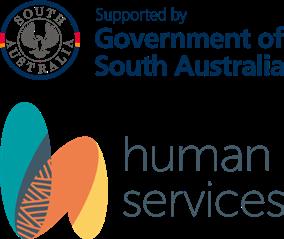
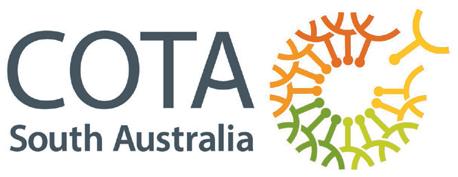
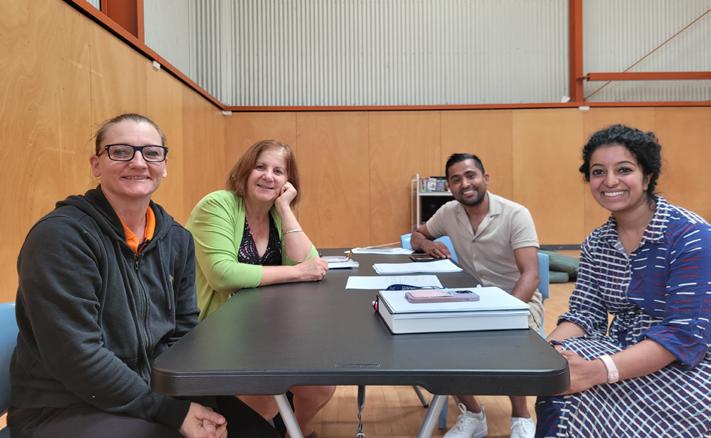
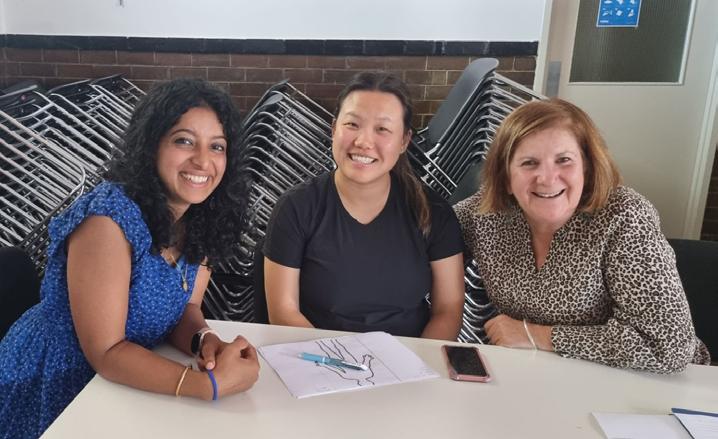

Their grant applications have centered around COTA SA’s Strength for Life; a program that focusses on progressive strength training, balance and fitness for older South Australians.
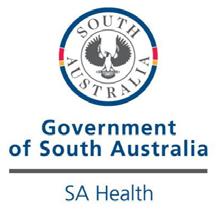
Strength for Life staff at COTA SA were delighted to collaborate and co-design the nuts and bolts of the Strength for Life sessions with Constance Jones (Manager at AWFOSA), Josephine Sheriff (Project Assistant at AWFOSA) and Amritha Aparnadas (Program Lead at STTARS), with support from Mohan Gautam (BHUMMATSS) incorporating the specific needs of each community group, including the most culturally appropriate instructors, equipment, locations and time schedules.
The two African women’s group sessions took place at St Clair’s Recreation Centre at Woodville, the Salisbury Hub and St John’s Church, Salisbury. STTARS planned and delivered sessions in Kilburn Hall for an
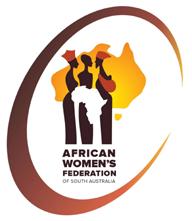
Afghanis Women’s Group and Salisbury Primary School for a Bhutanese Group.

It was wonderful to see the Strength for Life sessions come to fruition after intensive planning and to witness the community members from all four groups embrace Strength for Life with great enthusiasm and zest! The Strength for Life Program has so many physical and psychosocial benefits and promotes critical social connections.
The sessions would not have been the same without the dedication and expertise of Strength for Life fitness professionals Daisy Ahern and Melissa Bridge who have brought so much energy and warm connections to the program.
It is wonderful to see MCCSA’s community connections grants used in such a way that they promote holistic health and wellbeing to many members of our diverse community.
For more information about Strength for Life please visit COTA SA’s website www. cotasa.org.au
 Clara Tait (she/her) Cultural Diversity Officer 0420 871 721 ctait@cotasa.org.au
Clara Tait (she/her) Cultural Diversity Officer 0420 871 721 ctait@cotasa.org.au
P23
Photos: Strength for Life (various), supplied by COTA SA
MAKING A DIFFERENCE
MCCSA's diverse programs for a vibrant community
Going Places Transport
MCCSA's affordable and reliable transport solution for community organisations and individuals in South Australia. MCCSA's 'Going Places' has four buses in its fleet, including one wheelchair accessible bus, and can accommodate up to 12 people. MCCSA also offers volunteer drivers and is seeking expressions of interest for guided bus tours.
For more information, please contact Geoffrey Brown via geoffrey.brown@mccsa.org.au or call 0481 948 728.
Community Visitor Scheme
Our Community Visitor Scheme facilitates one-onone friendships between older people and community visitors speaking their language. They visit at least twice a month to build relationships and add warmth to the lives of our senior citizens, reducing their loneliness and isolation.
If you would like to volunteer, please email Maggie Asaad via maggie.asaad@mccsa.org.au or call 8213 4604.
Community Facilities
MCCSA offers a variety of community spaces for meetings, forums, workshops, and functions. These facilities include a 50-seat hall that is free of charge for registered MCCSA community groups, with a donation appreciated for rubbish removal and electricity. The hall is also available for commercial hire.
To hire an MCCSA community space, call us on 8345 5266 or email mccsa@mccsa.org.au
Men's Group
MCCSA's Multicultural Men's Group aims to improve mental health outcomes for men from culturally and linguistically diverse backgrounds. The group provides a safe and supportive space for men to connect, share experiences, and learn about mental health and wellbeing. Through a range of activities, including guest speakers and social outings, the Men's Group encourages men to break down cultural barriers and if necessary, seek help when needed.
For further information, contact Ukash Ali Ahmed via ukash.ahmed@mccsa.org.au
Successful Communities
Successful Communities is focused on providing individual support to vulnerable and emerging culturally diverse communities and their members. The program offers a range of activities, including workshops, leadership and networking events, and capacity-building activities.
For further information, please email Somi Lindsay at somi. lindsay@mccsa.org.au
Building Employer Confidence
Building Employer Confidence in Disability and Inclusion is a program that aims to create inclusive and diverse workplaces by providing training and support to employers, and supporting skilled CALD workers with disabilities to find suitable workplaces. This program offers a range of resources and services, including training workshops, internships, employer and diversity audits.
Want to know more? Contact Perrin Abbas on 8213 4603 or perrin.abbas@mccsa.org.au
AUTUMN 2023 | P24
Multicultural Playgroup
MCCSA's Multicultural Playgroup provides a safe and inclusive space for parents and children from diverse cultural backgrounds to connect and socialize. It aims to support children's development and help families overcome isolation through a range of social activities.
To get involved, contact Abby Liu via abby.liu@mccsa.org.au
Disaster Risk Reduction
This project aims to educate and prepare Communities to better respond to natural disasters and emergencies. MCCSA has developed fact sheets in a variety of languages, aiming to build community resilience and ensure that communities are better equipped to cope with emergencies.
To view the in-language resources, visit the 'Informed & Connected' page on our website, www.mccsa.org.au
EnCOMPASS
EnCOMPASS is a program that helps older people from CALD backgrounds access the aged care system and other supports. EnCOMPASS connectors assist elderly people who may have language and technology barriers. They provide access to My Aged Care and build capacity of CALD older people, their loved ones, and communities. EnCOMPASS program will remain active until June 2023, then transition to the Care Finder Program, designed to support older people with more complex needs.
Contact MCCSA Connectors via email mccsa@mccsa.org.au or call 8345 5266.
Cultural Connections in Disability
Cultural Connections in Disability is a project that develops and delivers culturally sensitive activities and resources for CALD people with disability. This aims to enhance their understanding

of available support and services, build their capacity to overcome social isolation, and explain their right to lead a good life. MCCSA produced a Disability Inclusion Video Series in collaboration with various communities and stakeholders across South Australia.
For more information, contact Katherine Greer at katherine. greer@mccsa.org.au
Interested in Volunteering?
MCCSA offers many exciting volunteer opportunities for those seeking a meaningful way to give back to their community. From Playgroup volunteers to tour guides and bus drivers, community visitors, and guest speakers, there's something for everyone. By volunteering with us, you'll be making a positive impact on the lives of CALD individuals and families, while also gaining valuable skills and experience.
Join our team today and make a difference! Email your CV and cover letter to mccsa@ mccsa.org.au
P25

Share your story by emailing communications@mccsa.org.au Multicultural Communities Council of SA Inc. 113 Gilbert Street, Adelaide | Phone 8345 5266 | www.mccsa.org.au Your Voice Matters.




















 Dr Marcella Meneguello Master of Philosophy candidate in Public Health Torrens University Australia
Dr Marcella Meneguello Master of Philosophy candidate in Public Health Torrens University Australia





 VERONICA DAVILA Communications Officer
VERONICA DAVILA Communications Officer



 GEORGE GOUZOUNIS CHSP Sector Support and Development Coordinator
OMAR AHMAD Inclusive Employment Officer
GEORGE GOUZOUNIS CHSP Sector Support and Development Coordinator
OMAR AHMAD Inclusive Employment Officer
















 Clara Tait (she/her) Cultural Diversity Officer 0420 871 721 ctait@cotasa.org.au
Clara Tait (she/her) Cultural Diversity Officer 0420 871 721 ctait@cotasa.org.au

